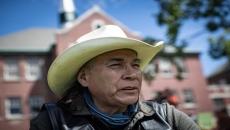OTTAWA - The government's representative in the Senate says members of a parliamentary committee set up to scrutinize the Emergencies Act will have to take an oath of secrecy.
Sen. Marc Gold also told senators that ministers are receiving hourly police updates about potential threats around the country to assess if the emergency law is still needed.
The Senate is debating whether to confirm the government's decision to invoke the Emergencies Act for the first time in Canadian history over protests and blockades of Canada's borders by people opposing vaccine mandates and other COVID-19 restrictions.
On Monday evening a majority of the House of Commons voted in favour of confirming the act after the NDP backed the minority Liberal government.
The act must also pass through the Senate, which plans to hold extra-long sittings to debate it. If it fails to approve it, the act would be immediately revoked.
If approved, a special joint committee of both the House of Commons and the Senate will be established to carry out a rolling review of the government’s actions under the act.
But Sen. Scott Tannas, leader of the Canadian Senators Group, expressed concern that the committee would not be set up swiftly enough. He asked Gold to commit to explaining every day until it convenes why the committee had not yet been constituted.
In often heated exchanges on Tuesday, Gold faced a barrage of questions from senators, including those querying whether the act was still needed now that the Ottawa protest and blockades of Canada's borders have ended.
"What emergency exists today other than some secret emergency you can't tell us about?" asked Tannas.
Tannas said it was a "testimony to Canadians even when they are hot under the collar and the professionalism of the police" that no one had been seriously hurt in the protests.
Gold said he believed that "the job is not yet done," warning that blockades could return and there are signs some protesters are reconvening.
"The calm we now see may be the calm before other events," he said.
He said ministers were receiving hourly updates from police forces around the country to inform them of potential threats so they could continuously assess if the powers in the act are still required. He said the protests had "metastasized into an explosion of illegal activities."
In lively exchanges, Conservative Sen. Leo Housakos questioned provisions in the Emergencies Act that allow banks to freeze protesters' accounts without a court order. He said a court order is needed even to freeze the bank account of a member of the mafia.
He also accused Prime Minister Justin Trudeau of stoking the flames of division and of not speaking to protesters but speaking down to them and characterizing them as Nazis.
He criticized the prime minister for labelling Tory MPs who have not condemned the protests as supporting people who wave swastikas.
Some protesters were seen flying swastika and Confederate flags and some organizers have been known to promote racist conspiracy theories online.
Gold staunchly defended the prime minister and said he does not recognize the Tory senator's characterization of Trudeau's actions and comments.
He said the Emergencies Act is justified because of the gravity of the protests, adding that everyone could resolve to listen more and listen better.
Sen. Salma Ataullahjan, a Conservative senator who chairs the Senate human rights committee, questioned whether invoking the Emergencies Act could set a precedent.
The government's representative in the second chamber said this question was "a preoccupation of many." Gold said the Emergencies Act was less far reaching with more checks and balances, including parliamentary scrutiny, than its predecessor the War Measures Act.






